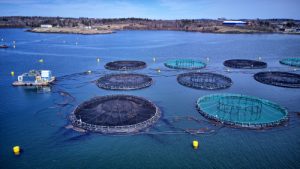
U.S. Sen. Roger Wicker (R-MS) on Sept. 24 introduced sweeping bipartisan legislation to establish a regulatory system for sustainable offshore aquaculture in the United States.
“Aquaculture is the fastest-growing food production sector, but the U.S. lacks a comprehensive, nationwide system for permitting in federal waters,” Sen. Wicker said. “This deficiency prevents the development of aquaculture farms, leading to more seafood imports.”
The Advancing the Quality and Understanding of American Aquaculture (AQUAA) Act of 2020, S. 4723, which Sen. Wicker sponsored with lead cosponsor U.S. Sen. Brian Schatz (D-HI), also would establish national standards for sustainable offshore aquaculture that Sen. Wicker said would enable “U.S. producers to create jobs and meet the growing demand for fresh, local seafood.”
Under S. 4723, the National Oceanic and Atmospheric Administration (NOAA) would be designated as the lead federal agency for marine aquaculture and would be directed to lead a research and development grant program to spur innovation throughout the industry, according to a bill summary provided by Sen. Wicker’s office.
Additionally, S. 4723 would include aquaculture management plans to implement the new standards on a regional scale and a national plan to identify and establish areas particularly well-suited for aquaculture, according to the summary.
The Office of Marine Aquaculture would be established within NOAA, charged with coordinating the federal permitting process, among other provisions listed in the bill summary.
The measure has been referred for consideration to the U.S. Senate Commerce, Science, and Transportation Committee, chaired by Sen. Wicker.



